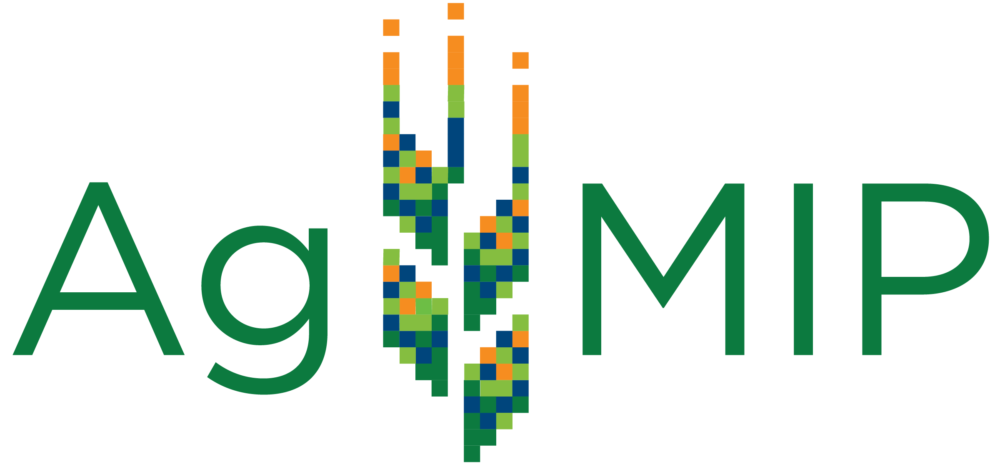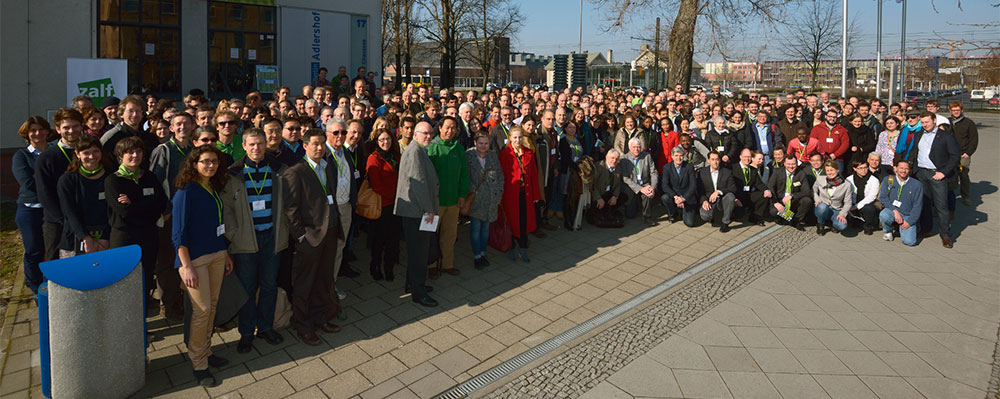Photo: iCROPM2016 participants from 47 countries photo:V. Schrader ©ZALF
Submitted by K. J. Boote and Peter Thorburn Co-Leads AgMIP Crop Modeling
More than 300 scientists from 47 nations met in Berlin, Germany, during March 15-17, 2016 to exchange ideas on improvement and application of crop simulation models to better predict agricultural production and food security under global climate change. The symposium was co-organized by AgMIP (the Agricultural Model Intercomparison and Improvement Project) and MACSUR (Modelling European Agriculture with Climate Change for Food Security), and was locally hosted by the Leibniz Centre for Agricultural Landscape Research (ZALF) in Müncheberg, Germany. The organizing committee included representation from AgMIP (Kenneth Boote, University of Florida, and Peter Thorburn, CSIRO-Australia) and from MACSUR (Frank Ewert, ZALF, and Reimund Rötter, Finland). Dr. Claas Nendel, ZALF, was the responsible local host and organizer.
During the exciting 3-day meeting, there were a total of 85 presentations and 130 poster presentations. In addition, there were numerous side-events on the prior and following days, during which scientists met on various initiatives, including AgMIP-Wheat, AgMIP-Canola, AgMIP-Maize, AgMIP-Crop-Water-ET, AgMIP’s Global Gridded Crop Model Intercomparison (GGCMI), the Global Yield Gap Atlas, and MACSUR’s working groups on model intercomparisons, impact response surfaces and scaling. Dr. Claas Nendel, local organizer from ZALF, commented: “The international crop modellers’ scene was very well represented here. The personal exchanges and the many discussions motivated researchers further who otherwise often only communicate over great distances. Numerous ideas for new developments arise during such symposia.”
Outstanding plenary lectures by James Jones (University of Florida, USA; The next Generation of Crop Models), Serge Savary (INRA, Toulouse, France; Models for Crop Diseases), Graeme Hammer (University of Queensland, Australia; Modelling and Genetics), Andrew J. Challinor (University of Leeds, UK; Models and Climate), and Brian Keating (CSIRO, Australia; Models and Cropping Systems) addressed the range of topics at the conference and challenged participants to think more deeply.
Alex Ruane (NASA, USA) also presented plans for AgMIP’s Coordinated Global and Regional Assessment (CGRA) of Climate Impacts on Agriculture and Food Security, which led to a motivating discussion and some initial plans for regional organization and protocol alignment ahead of the CGRA meeting at AgMIP6 in June.
The topics of the International Symposium iCROPM2016
The symposium of oral talks and posters focused on recent scientific work related to model improvement, generation and use of experimental data and on advancements in model application considering new methods of model intercomparison, uncertainty propagation and scaling. While the main emphasis was on crops, progress on grassland and vegetation modelling was also considered as well as new approaches of model implementation making use of recent software developments. Improvements in cropping system modelling at the field level as well as the higher landscape, regional and global level were reviewed. New approaches for linking crop modelling to genetics were presented. Studies to improve the modelling of relationships between plant production, pest damage, resource use and management including effects on water and nutrient cycles were also welcomed.
During the first of two closing plenary lectures, Prof. Achim Dobermann, Director of Rothamsted Research, highlighted how far opportunities with crop models have progressed to address major global challenges as well as the continuing challenges of meeting stakeholder needs. In his closing plenary lecture, Prof. Martin Kropff, Director General of the International Maize and Wheat Improvement Center (CIMMYT), which is dedicated to global maize and wheat improvement, emphasized the value and role of simulation models as important tools for driving breeding goals and improved management practices as adaptations to climate change. There was a concluding panel discussion moderated by Prof. Frank Ewert, the Scientific Director of ZALF, summarizing the challenges to crop model improvement and application. Prof. Ewert said, “It becomes clear that we are increasingly capable of estimating the extent to which climate change and policy decisions can affect crop productivity and food security.” He also said “The enormous progress in information technologies also offers novel opportunities for improved applications of the models. In the field of climate research it is very important for us to understand the impact of possible climate change and how to adapt agriculture to minimize potential environmental impacts.”
The International Crop Modeling Symposium was considered so successful that many participants are keen to see a follow-up Symposium in another two years. Ken Boote, Co-Lead, AgMIP Crop Modeling in AgMIP, concluded, “There was a wonderful spirit of collaboration and sharing and excitement throughout the entire symposium and the need to continue to work together on crop modeling.”
For further information, see the Symposium website.

